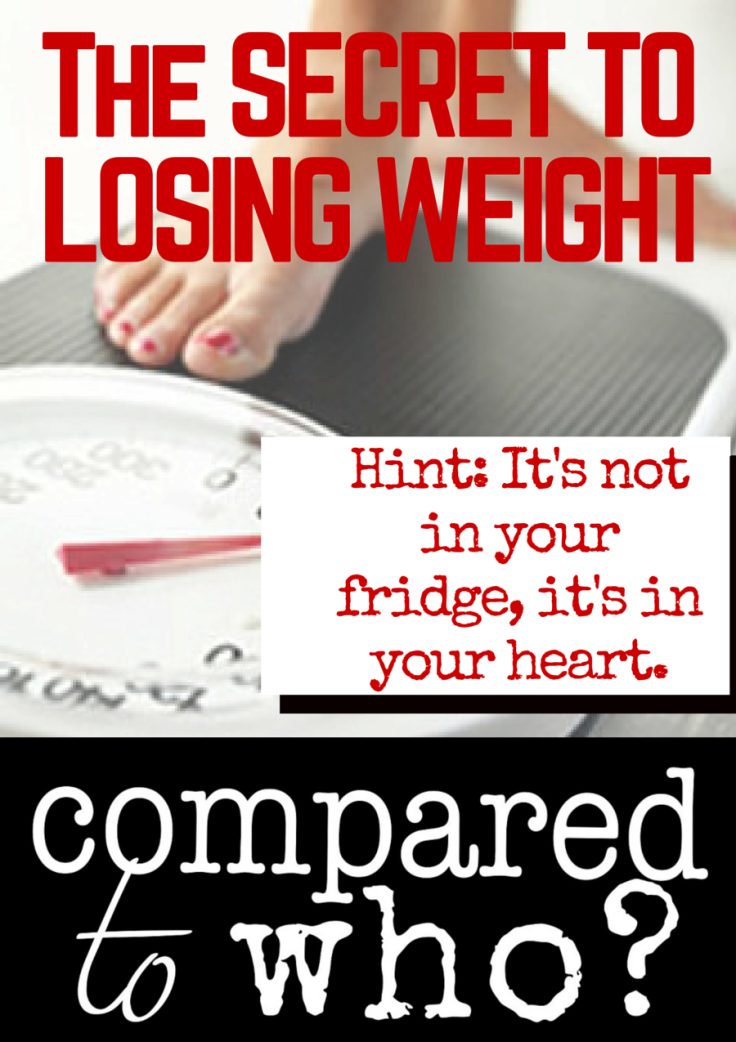There’s a big secret to losing weight that doesn’t have anything to do with carb to protein ratios, Crossfit workouts, or eating like a caveman. It has to do with love.
For the first time, ever, I stepped on the scale on New Year’s Day and saw a number I should have been happy with. Thanks to a half-hearted go at the Virgin Diet and a bad case of the flu, my annual January weigh-in was atypical. Almost ten pounds were gone.
Yet, I’ll be honest. It didn’t feel awesome. In fact, it didn’t really feel that different than any of those other years where I got the scale, looked down, and resolved how much better life would be if that number were lower. Instead, it was pretty much the same. I stood there wondering if that number was still too high to make me happy. I wish I had known this secret to losing weight sooner.
Yes. I know I have a problem. But, not the one you think.
It’s an affection problem.
Two months ago thousands (if not tens of thousands) of people resolved to lose weight. For most, this is a worthwhile goal. Yet, by now, many (if not most) of those who resolved to “finally do it” this time have given up. Why? Are they weak-willed? Did they choose the wrong diet? Do they just have too many obstacles to overcome?
No. I think it’s because they haven’t found a higher affection.
I recently watched Dr. Oz tell a Christian audience the secret to losing weight and sustaining it.
His answer: You have to start thinking about yourself. Put “you” first.
And, as I think about I realized: He’s partially right. Sometimes you do lose weight if you put all of your energy into prioritizing exercise or how you eat.
But, the challenge is putting ourselves (or our weight loss first) puts us in the precarious position of creating an idol out of weight loss, fitness goals, or me! Then it becomes so hard to give up our idols because we think they will make us happy. We think they bring us comfort and security. So, we chase the weight loss believing it will do something for us that it can’t. We believe it will unlock the door to a fabulous new life. But, instead, it just changes the scale. Maybe for a week. Maybe for a few months. Maybe just until it changes back again.
What I’ve found is when my intent is set on weight loss, my affections are set there too.
How to Change Your Affections.
So here is how changing your affection (what your heart loves) works: If you can replace your idol (current affection) with a higher affection (something you love more) then the thing you know longer love first begins to pale. The emotional connection fades. You begin to care more about the higher affection than the first love.
Practically, this is when you hear people say they can look at that plate of brownies and think, “No, I love myself (and my new skinny jeans) too much to eat you.” They believe they are saying “no” to one affection (brownies) and yes to a better affection (themselves).
But, please don’t stop reading here. This is NOT the secret to losing weight I was talking about.
There’s just one (HUGE) problem with this weight-loss strategy. Though arguably effective for a positive change in your body, becoming your own idol is destructive to the person who does it, to their relationships, and to every other aspect of their life.
It’s almost cliche, it happens so often. You see someone who has lost a significant amount of weight and what follows? Is everything else in their lives suddenly better now that they look awesome? Rarely. They have a hard time relating to old friends (though they make new ones who share their new affection). Their spouse can’t seem to make them “feel good” like they used to. Their relationships change. Everyone else is to blame.
A recent documentary on the aftermath of Ozempic showed a couple that were getting a divorce because of the man’s weight loss. He found a new priority in his life and his marriage wasn’t it.
So, then how DO you accomplish health goals without becoming your own idol? 
What is the secret to losing weight?
To be truly healthy, you need an even higher, (much) better, affection. The Gospel of Jesus Christ has the answer.
A Scottish theologian by the name of Thomas Chalmers preached on “the expulsive power of a higher affection” in the early 1800s. The gist of what he wanted people to understand is that it’s really difficult to abstain from sin if you only think about how “bad” it is to break the rules.
For example, simply meditating on how bad high fructose corn syrup is for your body is not enough motivation to keep you away from Oreos. (You can insert pornography, lying, drinking, drugs, gambling, or just about any struggle you have in that sentence to get the full impact of what he was saying.) Chalmers preached that we need a greater power, a greater affection, to get rid of (or expel) the sinful behavior.
Chalmers encouraged people to take their misplaced affections (like a love for too much food) and replace them with the far greater power of the affection of the gospel: the love of Jesus Christ. This secret to losing weight may seem simple, but it takes a lot of heart work.
Bottom line: If you want to lose weight in the healthiest way, you have to work out.
But, not just in the gym. You have to work out your salvation. When we can embrace how much love God demonstrated for us by giving up his son in our place…when we can fully receive that love…then, we can turn our affections away from what distracts us, what tempts us, and towards Him who first loved us.
He is the answer to all of our addictions not because he can help us have better willpower (though he can), but because his love is so big it can fill our hearts so we have no room for any of our previous loves (like brownies). His love — if we can grasp it — leaves no room for anything inferior.
If you want to lose weight and have failed…again…and again… Don’t despair! Rather, pray that God will give you a new affection: one for him that is so great that it dominates your heart. I believe you’ll find, in that place of crying out to Him, that he will be faithful to help you change your body as you change your heart. That is the secret to losing weight.
“Therefore, it is not enough to hold out to your people the mirror of their own imperfections. It is not enough to come forth with a demonstration of the effanecent character of their enjoyments, or to speak to their consciences of their follies. Rather, make every legitimate method of finding access to their hearts for the love of him who is greater than the world.” Thomas Chalmers
“For God so loved the world,that he gave his only Son, that whoever believes in him should not perish but have eternal life.” John 3:16






I definitely agree I lost 100 pounds in 2012 and blamed my husband for gaining 30 back. Reading this article made me realize today that instead of praying to help me through what I shouldn’t eat I play the blame game. Today New Year’s Day 2017 I can get back on track because I now realize where I going wrong. I know I did not find this post by accident I thank God and you for getting me back on track today.
Praying this year is a fresh start for you Vickie! Thanks for chiming in!
Thanks! I enjoyed this! I struggled with my weight for years until I realized it was a spiritual problem. I then lost 60+ lbs and have kept it off for several years now. I documented my spiritual struggles and thoughts on a blog post I did a few years ago: http://www.parker-house.blogspot.com/2010/05/thoughts-on-dieting-by-robert-parker.html
I’m sorry but I don’t agree with most of what was written in this post like assuming that people in larger bodies idolize food and concluding that if I choose to eat a brownie then I love the brownie more than God? And that if I Love God then I cannot like other things? Firstly, the fact that someone is “overweight” doesn’t automatically mean the person has a problem with overeating to the point of making food their idol (I know a lot of people in larger bodies who eat very normally and even less than a lot of slim people). Secondly I can love God and still enjoy the gifts he has given to us in a balanced way. For example I love God, I also enjoy taking peppermint tea in the evenings ( this doesn’t mean the tea is now an idol, it just means I enjoy it), same way I enjoy cookies when I want to have them, same way I enjoy reading and taking walks…
Hey Dora – I’m sorry, but I think you misunderstood the premise and heart of this post. This is absolutely not written for every woman – especially not for every woman of a particular size. If you read any of my other stuff you’ll know that my heart is to build up and encourage women of all sizes. I would never assume or tell a woman in a larger body that she’s not eating the right things or that she needs to lose weight. I think, ultimately, we should strive for heavenly crowns over the temporal, earthly “achievement” of weight loss. That’s not my heart. At all. Second, it’s not my heart or intention to tell anyone what they are idolizing. I’ve written dozens of other posts and even 2 books on idolatry. You can absolutely enjoy brownies…everything that God made that is delicious in this world, without it being idolatry. The post was written specifically for one demographic of women — the one who does every diet in the constant pursuit of weight loss and then goes off the diet in the constant pursuit of food (which is actually a physical reaction to deprivation…). In both the restriction and the obsession over food that comes with dieting – we make food an idol. But, idolatry is very personal. Only the heart knows when it’s idolizing. I’ve written volumes on this too. 😉 But, I’d never PRESUME idolatry on anyone. And, I certainly couldn’t presume idolatry on someone based on what I saw them eat. That’s ridiculous. Instead, what I want to emphasize is that ALL good things can become idols — if we give them too much of our time, our attention, or put them of a place of honor–making them first in our lives. God designed us to ENJOY life and his good gifts. We don’t have to be afraid to enjoy things that taste and feel good! (That’s ascetism not the Gospel.) Anyway, I’m sorry if I offended you in anyway -but I think the heart of this “disagreement” is the assumptions you read into the article that were not, in anyway, intended. This was a piece strictly for the woman who’s always on the quest for weight loss…(I would not wish that quest on anyone, no matter what their size. That’s a personal matter.) And it was written for the woman who does have a problem with obsessing over food. It sounds like that’s not where you’re coming from, so I can understand how it would be frustrating to feel that was implied. It was not. I hope this clears things up. Hugs and grace.